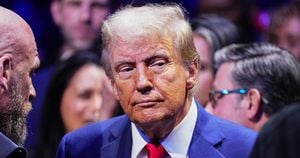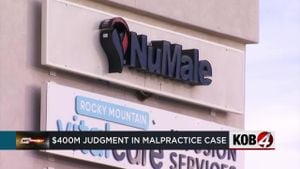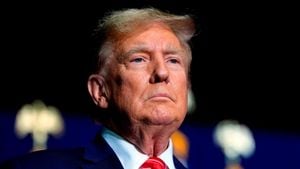Meta's CEO Mark Zuckerberg, known for leading one of the world’s largest tech companies, was recently spotted dining with none other than former President Donald Trump at Trump’s Mar-a-Lago estate. This meeting, held on Wednesday evening, has stirred significant chatter among political and business circles alike.
The dinner was characterized as both cordial and strategic, with sources indicating it was initiated by Zuckerberg himself. According to remarks made by a spokesperson from Meta, Zuckerberg expressed his gratitude for the opportunity to engage with Trump and his team at such a pivotal moment for American innovation. The spokesperson stated, "Mark was grateful for the invitation to join President Trump for dinner and the opportunity to meet with members of his team about the incoming administration,” emphasizing the importance of collaboration during this transitional period.
Ironically, the meeting takes place against the backdrop of their historically rocky relationship. Facebook, now part of Meta, had placed Trump under restrictions following his role during the January 6 Capitol riots, banning him from the platform for two years. Despite this contentious history, it seems both parties are eager to mend fences as they look toward the future.
Striking Up New Alliances
Stephen Miller, who has been appointed the deputy chief of staff for Trump’s second administration, confirmed during his appearance on Fox News's "The Ingraham Angle" the significance of Zuckerberg's presence at the dinner. Miller remarked, “Mark Zuckerberg has been very clear about his desire to be a supporter of and be part of this change we’re seeing around America,” reflecting the hope for new economic partnerships.
This dinner marks something of a turning point for Zuckerberg, who has faced scrutiny for Meta's previous political stances. Earlier this year, Zuckerberg had taken steps to distance himself from direct political influence, ceasing election-related philanthropic efforts and promising not to funnel money like he did during the 2020 election. Trump had previously criticized Zuckerberg’s actions as trying to manipulate the electoral process, dubbing Facebook as "a true Enemy of the People."
Following the election, Zuckerberg reached out to Trump immediately, extending his congratulations on the victory, indicating his intent to collaborate and support the new administration's policies.
The Business Landscape Ahead
The dynamics of the meeting highlight the significant intersections of politics and business. With Trump positioned to overhaul certain regulatory frameworks, many business leaders, including Zuckerberg, show deep interest in aligning with the administration's objectives. Zuckerberg, expressing ambitions of unity with Trump’s economic reform plans, has been careful to communicate his aspirations positively.
During their dinner, the two men reportedly engaged in discussions about technological innovations and their potential role under the new administration. While precise details about their conversation remain tightly under wraps, the focus was largely on how tech can contribute to national growth. This resonates well with Trump's platform, which consistently emphasizes revitalization and economic strength.
A Shift or Just Politics?
Critics may deem this meeting as Zuckerberg merely playing to the political winds, sacrificing prior criticisms of Trump for potential favors or influence. Nevertheless, the underlying message appears to be the establishment of new alliances between tech and political powerhouses, especially as the battle for innovation heats up amid global competition. Zuckerberg’s strategy seems aimed at positioning Meta to benefit from forthcoming changes anticipated during Trump’s term.
This shift may also hint at broader trends where tech executives deliberate on their company's influence within the political sphere, considering past experiences during the Trump administration. Tech leaders are growing increasingly accustomed to stepping outside traditional roles to guide policy discussions.
While it’s unclear if other influential figures, such as Elon Musk—who’s had his own peculiar interactions with Trump—were present at the dinner, Miller noted Zuckerberg's deep commitment to contributing positively to the national agenda.
A Glimpse of What’s to Come
Looking forward, Zuckerberg's engagement with Trump may signal the beginning of renewed collaboration between the tech industry and the Republican party. This dynamic could reshape the tech policy narrative leading up to the 2024 elections. Zuckerberg’s spokesperson reiterated the CEO's focus on supporting U.S. innovation at this pivotal time for the nation, highlighting the importance of bridging gaps between tech leaders and political frameworks.
Whether this dinner will morph from pleasantries to productive collaboration remains to be seen, but the potential ramifications could impact everything from legislative agendas to corporate strategies within the tech giants. Attending such events underlines the growing notion among tech leaders: to navigate the political sphere is as important as leading the business world.
For Zuckerberg, the path forward will require careful navigation and partnership-building if he wishes to recalibrate Meta’s standing among conservatives. How Trump’s policies will influence tech remains uncertain, but one thing is clear: this dinner at Mar-a-Lago may just be the prelude to months of strategic alignment between two undeniably influential figures.



